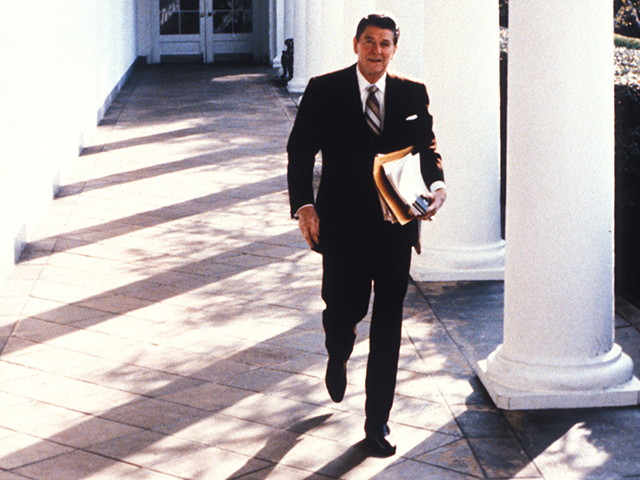Today we celebrate Ronald Reagan’s 103rd birthday. A little-known fact about President Reagan is that he is the only President to have ever published a book in office—and it was a book promoting the culture of life.
In it, he pledged that his Administration would champion the pro-life cause because it was dedicated to the “preservation of America as a free land, and there is no cause more important for preserving that freedom than affirming the transcendent right to life of all human beings, the right without which no other rights have any meaning.”
The Daily Signal depends on the support of readers like you. Donate now
As governor of California, Reagan had signed into law legislation that liberalized abortion. But he signed the law reluctantly, thinking that the legislature would override his veto. And he tried to make the law as harmless as possible, limiting the cases of justified abortion to rape, incest, and the health of the mother. The bill was titled the “Therapeutic Abortion Act,” and Reagan would sadly learn that doctors were willing to call just about any abortion “therapeutic.” He immediately regretted the decision.
What Reagan learned from his experience in California prompted him to champion the pro-life cause in the White House. In Abortion and the Conscience of the Nation, published in 1983, Reagan explained what Roe v. Wade had wrought for our nation:
The 10th anniversary of the Supreme Court decision in Roe v. Wade is a good time for us to pause and reflect. Our nationwide policy of abortion-on-demand through all nine months of pregnancy was neither voted for by our people nor enacted by our legislators—not a single state had such unrestricted abortion before the Supreme Court decreed it to be national policy in 1973. But the consequences of this judicial decision are now obvious: since 1973, more than 15 million unborn children have had their lives snuffed out by legalized abortions. That is over ten times the number of Americans lost in all our nation’s wars.
As we mourned the 41st anniversary of Roe last month, the number of American lives that have been ended by abortionists has sadly grown to 55 million.
Reagan saw Roe for what it was, a travesty of law:
Make no mistake, abortion-on-demand is not a right granted by the Constitution. No serious scholar, including one disposed to agree with the Court’s result, has argued that the framers of the Constitution intended to create such a right. Shortly after the Roe v. Wade decision, Professor John Hart Ely, now Dean of Stanford Law School, wrote that the opinion “is not constitutional law and gives almost no sense of an obligation to try to be.” Nowhere do the plain words of the Constitution even hint at a “right” so sweeping as to permit abortion up to the time the child is ready to be born. Yet that is what the Court ruled.
Reagan encouraged pro-lifers not to lose hope:
Despite the formidable obstacles before us, we must not lose heart. This is not the first time our country has been divided by a Supreme Court decision that denied the value of certain human lives. The Dred Scott decision of 1857 was not overturned in a day, or a year, or even a decade. At first, only a minority of Americans recognized and deplored the moral crisis brought about by denying the full humanity of our black brothers and sisters; but that minority persisted in their vision and finally prevailed. They did it by appealing to the hearts and minds of their countrymen, to the truth of human dignity under God. From their example, we know that respect for the sacred value of human life is too deeply engrained in the hearts of our people to remain forever suppressed. But the great majority of the American people have not yet made their voices heard, and we cannot expect them to—any more than the public voice arose against slavery—until the issue is clearly framed and presented.
So what is the issue, clearly framed and presented? Reagan explained:
I have often said that when we talk about abortion, we are talking about two lives—the life of the mother and the life of the unborn child. Why else do we call a pregnant woman a mother? I have also said that anyone who doesn’t feel sure whether we are talking about a second human life should clearly give life the benefit of the doubt. If you don’t know whether a body is alive or dead, you would never bury it. I think this consideration itself should be enough for all of us to insist on protecting the unborn.…
Who can forget George Will’s moving account of the little boy who underwent brain surgery six times during the nine weeks before he was born? Who is the patient if not that tiny unborn human being who can feel pain when he or she is approached by doctors who come to kill rather than to cure?
The real question today is not when human life begins, but, What is the value of human life? The abortionist who reassembles the arms and legs of a tiny baby to make sure all its parts have been torn from its mother’s body can hardly doubt whether it is a human being. The real question for him and for all of us is whether that tiny human life has a God-given right to be protected by the law—the same right we have.
And Reagan insisted that his Administration would be at the forefront of the pro-life movement:
Abraham Lincoln recognized that we could not survive as a free land when some men could decide that others were not fit to be free and should therefore be slaves. Likewise, we cannot survive as a free nation when some men decide that others are not fit to live and should be abandoned to abortion or infanticide. My Administration is dedicated to the preservation of America as a free land, and there is no cause more important for preserving that freedom than affirming the transcendent right to life of all human beings, the right without which no other rights have any meaning.
As we honor President Reagan’s legacy, let us continue to work to build a culture of life. To help all Americans in that work, The Heritage Foundation has partnered with our allies in the pro-life movement to produce a new booklet. Download the new booklet How to Speak Up for Life or order copies for a group.





























